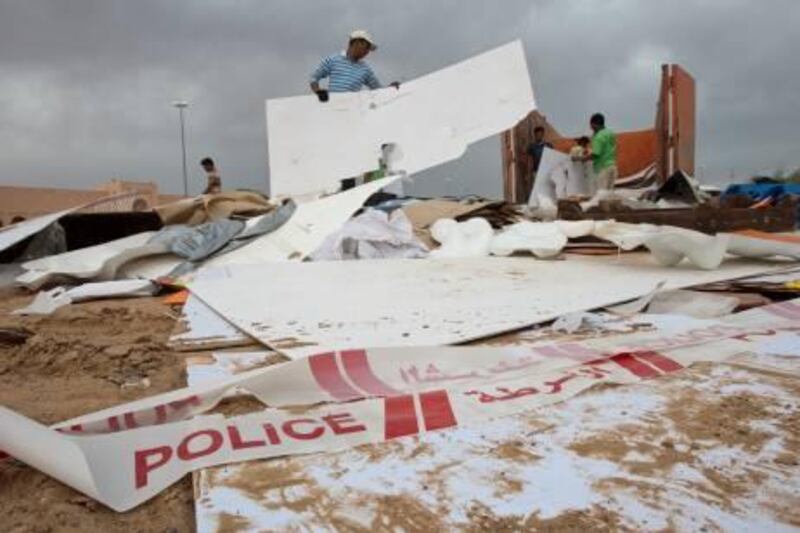AL AIN // Some of the shoppers most seriously injured in last weekend's souq collapse have described terrifying scenes in which hundreds of people trampled over each other to escape from the falling poles, boards and stays.
More than 1,000 people, mostly women and children, were inside the tent when it collapsed on the night of April 10 as winds gusted at up to 130kph. Almost 50 were rushed to hospital, mostly with broken bones. Eight days later, three remain at Al Ain hospital.
Fatima Abdullah, a 34-year-old Omani mother who is eight months pregnant with her second child, suffered eight broken bones in her back and shoulder.
"I was there with my husband, we went to buy things for the baby, Syrian and Egyptian things, so we knew the shops we needed to go to," she said yesterday.
"We were at the last one when suddenly my husband pulled me by my hand to leave the place, saying it will collapse.
"I said that it is impossible for the tent to collapse. Within seconds, though, it did."
She is convinced the tent should have been strong enough to withstand the winds. "It is impossible for the wind to make the tent fall, the wind did not last two seconds. Straight away it fell."
One of the metal tentpoles fell over onto Mrs Abdullah's back, and she fell to the ground on top of her husband.
"The light was cut off, so many others were running on top me," she said.
"My husband was trying to stop them, yelling at them there is a woman here, but no one could see anything."
Although her husband, Mohamed Hajan, had suffered a leg injury, he managed to pull his wife up and drive her to Al Ain Hospital.
"He had to take me. If I had waited, my situation could have gotten worse.
"Imagine, there was no police, no ambulance, no nothing there. What if there was a fire, what would have happened?"
When they reached the hospital, they found it overwhelmed by the number of injured shoppers.
"It was so crowded that night at the souq, even before the collapse the walkways were tight and crowded," she said.
Her main concern, though, was for her unborn child.
"I had to go through X-rays because they needed to see what was broken and if there was internal bleeding," she said, admitting she was worried about the effect of the X-rays on her baby.
Her pregnancy has made treatment difficult; even now doctors have yet to find a medication that would not harm her child, and she finds talking painful.
"I am talking slow because talking is so hard," she said. "They said it is hard to treat me. They used one injection on me but it gave me contractions, so then they stopped.
"Imagine, I am in pain and there is no way for it to be treated. I cannot even get up and eat. It's even hard to breathe.
"The doctors are still looking for a medication to work on me to send me home, but nothing is working."
She is worried, too, about giving birth. "I cannot have a natural birth - it needs energy, which I don't have, and you need a lot of energy in your chest, and I cannot move my right shoulder at all."
MMS, a 25-year-old Omani who is in the same ward as Mrs Abdullah, broke her leg and hip in the collapse, and is likely to remain in hospital for another six weeks. She complained that the tent should have been able to withstand that night's storm.
"The tent was not fixed probably, if it was this would have not happened," she said.
"It all happened in maybe three minutes. I ran, but a metal pole hit my back and I fell on the floor. When I tried to get up another pole slammed on my hip."
She said her sister, who was with her at the time, had received a phone call from her husband who was waiting outside warning them to leave the tent immediately. "He said it looked like it was shaking."
She and Mrs Abdullah had come from Bureimi, over the border in Oman, to visit the souq. MMS said many others from Oman did so too.
Meanwhile, the event organisers and Al Khaleej tents, which owned and erected the tent, are still waiting for the conclusions of a municipality investigation into the collapse. It will determine whether the accident was down to any deficiencies in the tent.
Mr Burhan's son, Islam, said he had a meeting with shopkeepers on Sunday to discuss payments and losses.
"Even if the tent was not secured properly, we have a chance if the report came out saying that it was just fate that Al Khaleej tents can pay from its insurance, because their insurance covers such catastrophes," he said.
"And if they find that they are wrong, then we have to go to court and get our rights there."
While the municipality approved of the spot used for the tent, the licence for the event was issued by the Abu Dhabi Tourism Authority. Before the souq opened, it was cleared by the Civil Defence, which checked exits and fire precautions but not structural integrity.
Regardless of any future improvements in safety standards, Mrs Abdullah is done with tents. Last Sunday was the first time she had managed to convince her husband to go to an event held in one.
"My husband doesn't like tents because they are so crowded," she said. "This time it is me, I would never go to a tent, even if it was for a wedding."





